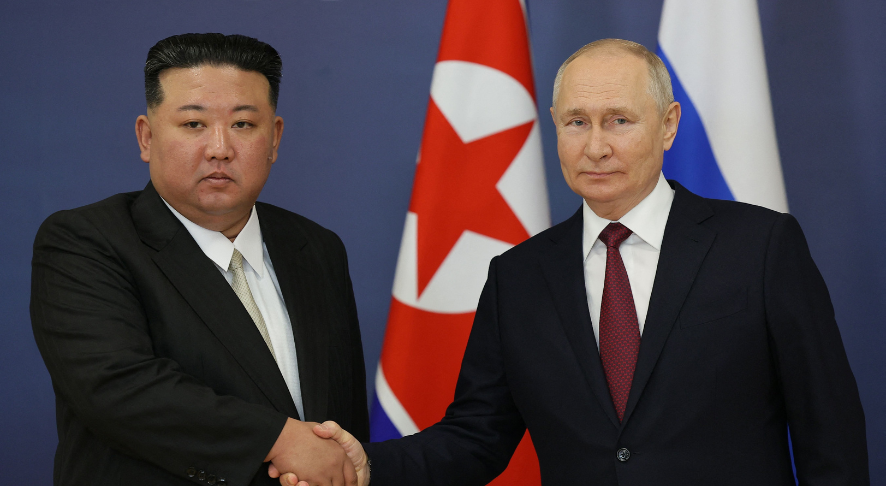
The Korean Peninsula once again finds itself on the brink, shaken by North Korea’s latest Hwasong-18 Intercontinental Ballistic Missile (ICBM) test. This third launch in just a few months showcased Pyongyang’s growing nuclear threat, capable of striking anywhere in the United States. However, the tremors of this test only hint at the larger earthquake brewing underneath: a budding military alliance between North Korea and Russia, further straining relations with the US and its allies.
Defiance at the UN
The world watched in dismay as North Korea defiantly launched its ICBM on December 17th. At the subsequent UN Security Council meeting, the US and its allies met Pyongyang’s actions with resounding condemnation. Yet, amidst the outcry stood North Korea, finding an unexpected ally in Russia. Their unwavering support for each other signaled a new phase in their relationship, raising concerns about what this unprecedented alliance might entail.
Russia and North Korea join forces
Adding another layer of intrigue to their long-standing ties, Russia’s Deputy Defense Minister, Valery Gerasimov, officially confirmed “active comprehensive cooperation” with North Korea. This announcement follows Putin’s September summit with Kim Jong-un, where they discussed potential military collaboration despite UN sanctions against Pyongyang’s weapons programs. The implications of this partnership are deeply worrying, potentially strengthening North Korea’s military capabilities and emboldening its belligerence.
A looming threat
US and its allies sound the alarm
The US and its allies have expressed mounting concern over this burgeoning partnership. They worry that North Korea could provide weapons and ammunition to Russia, replenishing Moscow’s dwindling stocks in Ukraine. Additionally, suspicions linger that Russia may be helping Pyongyang evade sanctions, significantly enhancing its military prowess.
The international community must take immediate and decisive action amid these escalating tensions. Robust diplomatic efforts are crucial to de-escalate the situation and prevent further proliferation of dangerous weapons. The UN Security Council must enforce existing sanctions against both North Korea and Russia, upholding international law and global security.
Deterrence and diplomacy
While diplomacy is paramount, it may not be enough. The US and its allies must demonstrate clear resolve in deterring further aggression from the emerging Russia-North Korea axis. Strengthening military presence in the region and conducting joint exercises are essential to send a strong message of deterrence. Simultaneously, exploring pathways for denuclearization with North Korea remains crucial in the long term, offering a glimmer of hope amidst the darkness.
The world stands at a precipice, facing a potentially catastrophic security crisis. The burgeoning military alliance between Russia and North Korea serves as a stark reminder of the fragility of global peace. Navigating this perilous situation requires an unwavering commitment to diplomacy, deterrence, and, ultimately, finding a peaceful resolution to the nuclear threat emanating from the Korean Peninsula. Failure to act decisively could plunge the world into a new era of fear and uncertainty, with consequences that none can afford to contemplate.
